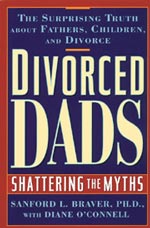
Calgary Herald, Charles W. Moore July 29, 1999
Feminist "analysis" dismissive of fathers
Charles W. Moore goes after quack psychologists busy "deconstructing" fatherhood
I am beginning to wonder if being a card-carrying lunatic facilitates getting published in journals of the American Psychological Association (APA)
A report, recently published in the APA's Psychological Bulletin, by Bruce Rind, Philip Tromovitch and Robert Bauserman, asserted that the "negative potential" of child sexual abuse has "been overstated." The authors rationalized that while "child sexual abuse is harmful," supposedly consensual "child-adult sex" is not necessarily harmful and may, in some cases, even be "beneficial."
Facing a firestorm of protest, the APA backed off, grudgingly releasing a resolution condemning all "sexual relations between children and adults."
Now the APA nuts are at it again. An article in the June 1999 issue of an APA journal, The American Psychologist, argues that the presence of fathers in families raising children is " not essential," and that fathers "may be detrimental to the child and mother." In deconstructing the Essential Father, Louise B. Silverstein and Carl F. Auerbach proceed to "deconstruct" traditional ideas about fatherhood and marriage that they disparage as "neo-conservative."
They dismiss the assumption that single mothers have a difficult time raising boys as based in "the large culture context of male dominance and negative attitudes toward womenWithin patriarchal culture, boys know that when they become adult men, they will be dominant to every women, including their mother." It is obvious this attack on fatherhood and the family is pure postmodern feminist quackery. Indeed, Silverstein, (alarmingly) past president of the APA's division of family psychology, is chair of the APA's Feminist Family Therapy Task Force. What this article isn't is science, because its conclusion fly in the face of all credible research on the topic.
According to data complied by the National Centre for Public Policy Research:
- Boys with father and mother at home are half as likely to be incarcerated, regardless of their parents' income or educational level.
- According to a Men Against Domestic Violence survey, 85 per cent of youths in prison come from fatherless homes.
- Teenage girls raised in homes with fathers are significantly less likely to engage in premarital sex, and 76 per cent of teenage girls surveyed said their fathers are very or some what influential over their decisions regarding sex.
- Girls raised in single-mother homes are more likely to give birth while single and are more likely to divorce and remarry. Girls whose fathers depart before their fifth birthday are especially likely to have permissive sexual attitudes and to seek approval from others.
- Paternal praise is associated with better behavior and achievement in school, while father absence increases vulnerability and aggressiveness in young children, particularly boys. Kids of both sexes whose fathers actively participate in their early development tend to have higher IQs, get higher marks in school and possess a better sense of humour.
- Fatherless children are "at a dramatically greater risk" of drug and alcohol abuse, according to the U.S. Department of Health and Human Services.
- When fathers don't live with their kids, the children are 4.3 times more likely to smoke cigarettes during their teenage years.
- A white teenage girl with an advantage background is five times more likely to become a teen mother if she grows up in a household headed by a single mother instead of with her biological father and mother.
According to data cited by Walter Schn[ei]der of Equal Parents of Canada, children from single-mothers households (compared to children of two parent households) are:
- Eight times more likely to go to prison.
- Five times more likely to commit suicide.
- 20 times more likely to have behavioral problems.
- 20 times more likely to become rapists.
- 32 times more likely to become runaways.
- 10 times more likely to abuse chemical substances.
- Nine times more likely to drop out of high school.
- One-tenth as likely to get A's in school.
Statistical evidence overwhelmingly indicates that "analyses" like those of Silverstein and Auerbach are mere political advocacy with no basis in fact.
Copyright © 1999 Calgary Herald New Media





